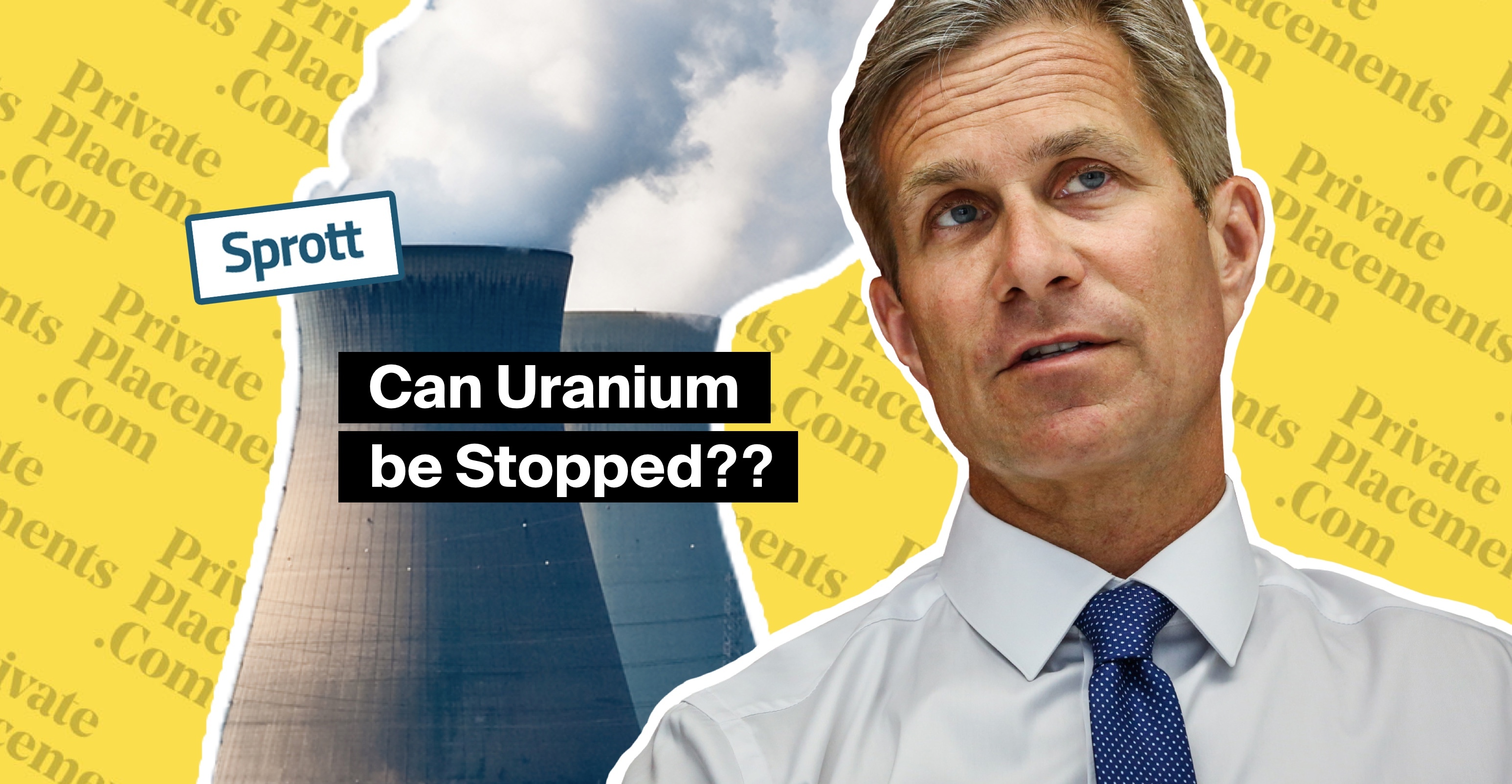Sprott CEO Peter Grosskopf on Uranium and Sprott's New Private Placements Offering
A couple edits and our most recent interview is back up! Sorry for the delay, everyone—but we're confident this content is still fresh and very relevant to our viewers.
Sprott Inc. CEO Peter Grosskopf is a driving force in uranium, precious metals, and real assets investment.
Here, in an interview with Arash Adnani, he outlines the company's strategy behind the company's massive new Sprott Uranium Physical Trust, explains how more investors can gain exposure to private placements with the company's new Resource Exploration and Development PP Fund, and dives into why he sees a potential metals rally in 2022 and beyond.
HIGHLIGHTS
- [1:40] - Peter's overview of Sprott Inc., and how it's involved in all aspects of metals and natural resources
- [3:32] - Discussion on Sprott's influential new Physical Uranium Trust
- [7:54] - The uranium investment thesis, and whether Peter sees any potential threats to the story
- [10:47] - Why uranium should be considered an essential piece of a decarbonized grid
- [12:13] - Sprott's new private placement fund for investors, the Resource, Exploration, and Development Private Placement LP (RED PP LP), and why Peter will be subscribing to it
- [14:59] - The three pieces that make the new private placements fund so exciting
- [17:20] - What else is Sprott working on right now, and why the precious metals industry is stronger than ever
- [18:02] - Why Peter sees a potential precious metals rally in late 2021 and early 2022
- [19:32] - Does Peter think that cryptos have stolen precious metals' thunder in 2021?
Sprott Asset Management LP is the investment manager to the Sprott Physical Uranium Trust (the “Trust”). Important information about the Trust, including the investment objectives and strategies, applicable management fees, and expenses, is contained in the Management Information Circular and the Prospectus.
Please read the Management Information Circular and the Prospectus carefully before investing. You will usually pay brokerage fees to your dealer if you purchase or sell units of the Trust on the Toronto Stock Exchange (“TSX). If the units are purchased or sold on the TSX, investors may pay more than the current net asset value when buying units or shares of the Trust and may receive less than the current net asset value when selling them. Investment funds are not guaranteed, their values change frequently and past performance may not be repeated.
The Resource Development and Exploration Private Placement Fund is for Qualified Clients with more than USD $2,100,000 of investible assets. Past Performance is no indication of future returns.
Securities are being sold in Canada only to Permitted Investors under an exemption from Canadian prospectus requirements. This material may not be distributed, published, or reproduced, in whole or in part, without the prior approval of Sprott Inc. and Sprott Asset Management USA, Inc. This material should not be considered an offering to invest in any product.
Charts or quotes from other sources have been selected because, in our view, they provide an interesting, provocative or enlightening perspective on current events or the topic of discussion. Their reproduction in no way implies that we endorse any part of the material or investment recommendations that might be included. Investments, commentary and statements are unique to this strategy and may not be reflective of investments and commentary in other strategies managed by Sprott Asset Management USA, Inc., Sprott Asset Management LP, Sprott Inc., or any other Sprott entity or affiliate. Opinions expressed in this presentation are those of the Portfolio Manager of Sprott Asset Management LP and may vary widely from opinions of other Sprott affiliated Portfolio Managers.
The intended use of this material is for information purposes only and is not intended to be an offer or solicitation for the sale of any financial product or service or a recommendation or determination that any investment strategy is suitable for a specific investor. Investors should seek financial advice regarding the suitability of any investment strategy based on the objectives of the investor, financial situation, investment horizon, and their particular needs. This information is not intended to provide financial, tax, legal, accounting or other professional advice since such advice always requires consideration of individual circumstances. The investments discussed herein are not insured by the FDIC or any other governmental agency, are subject to risks, including a possible loss of the principal amount invested. Additionally, opinions are subject to change without notice.
Generally, natural resources investments are more volatile on a daily basis and have higher headline risk than other sectors as they tend to be more sensitive to economic data, political and regulatory events as well as underlying commodity prices. Natural resource investments are influenced by the price of underlying commodities like oil, gas, metals, coal, etc.; several of which trade on various exchanges and have price fluctuations based on short-term dynamics partly driven by demand/supply and also by investment flows. Natural resource investments tend to react more sensitively to global events and economic data than other sectors, whether it is a natural disaster like an earthquake, a pandemic, political upheaval in the Middle East or release of employment data in the U.S. Sprott Asset Management LP, affiliates, family, friends, employees, associates, and others may hold positions in the securities it recommends to clients, and may sell the same at any time.
Transcript
Arash Adnani:
Hey everyone, it's Arash Adnani from privateplacements.com. We're back with another really exciting one. When we do some of these interviews sometimes we luck out, and the guest that we bring on happens to be a guest that is very much so involved in very topical events and topics. And today is exactly that. We have the CEO of Sprott Inc., Peter Grosskopf with us today. Peter, thanks for joining me.
Peter Grossko pf:
Thanks for having me, Arash. Nice to see you.
Arash Adnani:
Nice to see you as well. Listen, you guys have been absolutely dominating the headlines with the Sprott Physical Uranium Trust. Especially this week, there's news and more physical uranium being added to the reserves. What I want to talk about... We will get to that and we will get to some of the other things you guys are working on. Just as a background, I met Peter about a month ago. We were talking and Peter was giving me a list of everything that Sprott was doing in addition to spot the uranium trust, et cetera. And I got so excited that a couple days later, I emailed Peter and I said, "Listen, can you do an interview? because there's so much going on here that I'm not really sure people really understand." And a lot of it is relevant. A lot of it I think is extremely relevant to our audience. So I'd like to do an overview view. We'll talk about some of the smaller items or details, but first off, Peter, can you just give us a background, an overview of Sprott Inc., the organization and everything that falls underneath it?
Peter Grosskopf:
Sure. Well, Sprott has been around for 40 years, and so we're no overnight success, but we've been building, the vision is to build the world's premier firm at providing precious metal and other mineral investment services to our clients. And we've assembled a great team talent that most people would recognize in order to do that. Our strategies are unique and they go all the way from physical metals on the one hand to very private focused strategies on the other. So we manage a total of, just shy of 20 billion US. A lot of that is in our physically stored and a trusted services that we provide investors buying our trusts on the New York stock exchange in Toronto now, and then we have public equity strategies. So we run equity mutual funds and hedge funds like other precious metal managers would. And then we have private strategies that focus on project developments and, more specific mandates. They're both debt, sometimes equity, streams, royalties, and finally private client services, which is a, brokerage activity where we handle high net worth clients and clients that want to deal with us for the purpose of doing placements. So it's pretty broad. And we get involved in all aspects of minerals ranging from early stage drilling to late stage production and physical metals and cells.
Arash Adnani:
I think the name Sprott when you think of it as a brand, and when you think about the natural resource space globally, it's a name that always comes up, whether it's a lead order or it's one of the physical metal trust, the one new offering spot, the Sprott Physical Uranium Trust has been for lack of better terms, a shot in the arm of a sector that was starting to get maybe a little bit tired. It kind of reminds me of when you're watching a soccer game and you're in the 75th minute, the team's tired and the coach sub on the new player and the new player got of fresh legs. And here you guys come in, I believe it was maybe late July that..., of the inception, since then you've exceeded 32 million pounds of physical uranium for investors. This is probably the best way to have access as an investor or exposure to physical uranium. And the spot price yesterday is back to 47. Can you?... Sometimes I forget because me and you and other people that follow this story are so close to it. We forget that there's a whole world that's not quite understanding this story and the opportunity. Can you give us a background on what led to Sprott wanting to start this and become a serious player in the space?
Peter Grosskopf:
Well, it's been a long time coming, so we've been following uranium and investing in uranium for decades, and we were, and have, have been, and still are some of the bigger invest equity investors in the sector. The uranium trust UPC was brought onto to Toronto and Sprott played a pretty crucial role as its in its inception over 15 years ago, I believe. And this, even this recent deal took three or four years in total to plan out. And what it involves is really a modernization of a physical trust to hold uranium. It involves marketing that trust to a much wider audience and to having that provide a daily nav, more information, more content about the sector and a more active creation program for new shares. So it's really modernized in every way. We plan a few more improvements and we're trying to get the liquidity to a higher level. And we're trying to make sure that investors have access to that information all the time. And it's worked out just as well as we thought it would. And it's really become the preferred trading unit for physical uranium.
Arash Adnani:
When I think a lot of people are wondering this and you don't need to give me an exact date, but I know there's been talks about having a US ticker or not a US ticker, because you already have that, but a up listing to a major board in the US. Do you guys have a timeframe for that? Cause I personally think when you read Twitter on this topic, a lot of people think, "that's just going to be a nothing burger, it's not going to really do anything". I strongly disagree. I think it's just going to have this massive kind of tsunami of new investors and funds that can now kick in. Is there a rough timeline for that for you guys that you can share with me?
Peter Grosskopf:
Well, I'll start by agreeing with you. Most of our clients are in the US and we do think that US listing helps a lot of those clients, whether it's by way of approvals or the broker dealers they're dealing with in the local US market, it does make a difference. And in addition to that, we have other possibilities globally in order to improve trading and liquidity. So it doesn't just stop there. In terms of the timetable can't answer specifics. That's handled by our specific product managers and legal people. And it's a complicated process. So can't give you an estimate on it.
Arash Adnani:
But you can confirm that it's in the works.
Peter Grosskopf:
We did mention that we would apply.
Arash Adnani:
Okay. I got a question for you. So I was looking at the numbers yesterday and this last weekend I was having lunch with two friends and the setup was like a joke, three investors walk into a room having lunch. There's the Canadian investor, there was an American investor and there was more of a, let's say a global investor that moves around a lot. And we're talking about different investments. I'm talking about uranium. I'm just thinking, you know what? I just don't see how it fails. I think it's the easiest story to understand. And one of them asked me, okay, well what could go wrong? This supply demand story, all that with the exception of a black swan event, like another Fukushima, what could really go wrong in this space and with this idea that we're consuming more than we're producing uranium. I mean and maybe you can't get too much into the weeds here, but from you guys, what do you look at as potential threats to this thesis?
Peter Grosskopf:
Well, it's funny because as much as the trading advantages of our product now spot is a short term advantage to the market. Our thesis is actually very long term. So uranium is an industry where things take decades and it's a market, which is not in the long term impacted from these, the short term trading elements. What we believe is that nuclear power is a fundamental aspect of a decarbonized grid and that you can't credibly talk about delivering that kind of energy load to the grid without nuclear. And that requires, it's like a super tanker turning around. It requires governments and environmental groups and engineering groups and permits to such a long time to change their views towards the grid and impact the reactor build cycle. That it will be hitting us for years and decades. So that increased demand as it starts to build will stress the uranium supply chain. And what we do know is that uranium has cost a lot more to take out of the ground than it's being sold for. So it's just a simple case of long-term demand changing the price and the industry structure for producers, which I have to also survive in the short term takes a while. But once it happens, I think it'll be a healthier industry. And I don't think much can derail that right now. I think all the pieces of the puzzle are in place to keep that in motion.
Arash Adnani:
I think one thing that's interesting and maybe kind of sad actually is we only think about energy during times of crisis. It's not something that you think about on the ongoing basis, but right now it's front and center with the energy crisis that we're experiencing in Asia and Europe. And sadly it's a reminder of how dependent we still are on fossil fields. I think a lot of people think we've made so much progress and headway and maybe we have, but what we're experiencing right now with the rise of natural gas and oil is that reminder. And I think maybe time that everyone really focuses and understands uranium as the premier alternative solution to fossil fuels. My question for you is this...
Peter Grosskopf:
Can't be serious about decarbonization without understanding that certain minerals like uranium and other battery minerals that are required are just in short supply for that coal sector to change to the degree that is being asked to change. So we're going to have many years of building up investments in those areas.
Arash Adnani:
Peter, I want to pivot to another topic that we discussed when we met a month that got me really interested. And our audience, I think, would find this fascinating as well. Sprott is launching a new private placement product. We are PrivatePlacements.com so when we hear something in that space, that we get a little excited and curious, you guys call it the red PPLP, which stands for the resource exploration and development, private placement LP. This is being launched out of the Carlsbad office, and it's filling up fast. You guys are basically had opened this up, I believe, to Sprott clients first, and I have some questions, but tell us first what the product is, and I'll get to my follow up questions afterwards.
Peter Grosskopf:
Well, for us, private placements are an essential tool to use in this industry. It's a way for us to get enough money working in early stage opportunities to ensure that they have the capital they need to complete their task, which is usually to develop a resource and it gives our clients the access points. So we're a very experienced investors and have used that strategy for a long time. It's a business that was previously run by Rick Rule. And most of your viewers would probably know him. He's a legend, but Rick was one person and he would have to negotiate deals, price deals, research deals, and complete all the paperwork for his clients. It was a very laborious process. And what this new product for us does is it automates and it creates much more efficient vehicle. It has the buying power, and it has the timing power to get access, the right opportunities at the right.
Peter Grosskopf:
That's what it's all about. And also, I would say that it has the ability to be efficient. The paperwork is efficient. The portfolio can be run as an efficient portfolio, as opposed to having to select kind of awkward sizes of deals at various points in time. And it's managed efficiently by a team of technical specialists that can do the groundwork very quickly, and then also handle the selling process when it is time to sell an investment at the right time. I know even when my access to the business, I can't do that for myself. So this even for me, I'm going to be subscribing to this product, because it's a wonderful way of approaching that business.
Arash Adnani:
I think as someone who invests in private placements, when I started reading about this more, a few things got me excited, and I'd like to just list them off. The number one thing is the buying power that you get when you join a fund and that buying power allows you to dictate your own terms, which is very, very important. You can get much greater terms when you have that sort of buying power, because you can be the lead order now. Secondly, and you touched on this, is the efficiency I hate to this day having to go through these damn sub agreements that are just so tedious and no one has time for that. And to add on top of that, no one has time to research all these deals that are out there. And there's a lot of good deals.
Arash Adnani:
So having this kind of committee that's doing the legwork for you and in addition to that, this isn't just for Canadian deals or US deals. You guys are looking at ASX, the Australian stock exchange, global...
Peter Grosskopf:
Global deal.
Arash Adnani:
And let me tell you, I think bandwidth and how much time you have in the day is finite. And you don't have enough time to look at all these deals. So for those reasons, I'm actually, I guess, a disclaimer concerning in myself because I think it's a no-brainer if you want exposure to natural resources using PPs. And that got me really when me and you were talking initially, which is kind of the catalyst, why I emailed you and I said, "Hey Peter, we should do a talk because our audience needs to know about this". I think this is a great opportunity. And I think that, and you touched on this and I still struggle with this. I have a hard time with my timing on when to sell. Sometimes my timing's good, sometimes it's not, but the emotional turmoil that I go through, anytime it's time to decide, I could do without that.
Peter Grosskopf:
And you lose track running our own portfolio. So as you mentioned, those of us who know the business the best, if we're able to say, "look, this is a great idea". I think, those who are occasional investors should see it as the same. So we're excited about it. I think it's going to be a great new way to approach that business.
Arash Adnani:
That's fantastic. Can you tell us about... And it just kind of sounds like I'm being very greedy. Maybe the expectations are too high, but what else are you guys working on?
Peter Grosskopf:
Well, I've got to say I've never seen our company in better shape and investors are coming back to the mineral sector in a big way. It's broader and more sustainable in my view than it's ever been in the past, precious metals while they've been out of favor this year, while everything else kind of skyrockets are such a great hedge against the financial system. And I think investors are more broadly holding them in portfolios. So that's still our mainstay.
Arash Adnani:
And what's your take on, I know you touched on precious metals and gold and silver, do you think right now there's some good deals to be had. I talked to Rick recently and he's talking about how he's starting to look at some silver deals, some royalty companies, do you, in your personal opinion or Sprott opinion, do you see that there could be a rally with some strength, some legs on it going into the end of this year and early next year?
Peter Grosskopf:
I do, personally I don't expect that the taper will be successful. I think the taper is going to create stress in the system. And I think with that stress, precious metals will do very well. The equities are coming from a depressed valuation base. As I mentioned, I think there's going to be M & A in the sector. I think the larger producers are going to gobble up some of the intermediates and the intermediates are going to gobble up some of the developers. So what we see is a very constructive base right now, and we are looking, we are shopping, looking for opportunities for new investment.
Arash Adnani:
So it's definitely a buyer's market. Would you say so?
Peter Grosskopf:
It's been a buyer's market, certainly this year. I mean, the sector's really taken a pause. A lot of stocks have consolidated and there's been a lack of new buyers to the sector. I think that will all change within a few short months.
Arash Adnani:
Do you have a personal opinion on, and you hear this a lot about how Bitcoin and cryptos have really stolen some of the energy that used to go into precious metals and that's no longer there, what's your take on that? Do you think there's validity to that or is it just really not true?
Peter Grosskopf:
Well, it's valid because it's happening. And I would say cryptos have certainly becoming a 2 trillion dollar asset class, cryptos have taken flow away from gold and silver. I don't think that's debatable. What is interesting is they do have the same philosophy. And for us we'd much rather be involved with a hard asset backing like gold or silver. I think it's more proven, in the end it will be more liquid and also a bit more stable. So we prefer our sector. But what I can tell you is that I would expect gold and silver to go on the blockchain and to compete more effectively with cryptos as well. So I think that whole rush will come in as gold and silver themselves will adopt to be blockchain eligible and to appeal to a younger investor base.
Arash Adnani:
Is that something that Sprott would look at and try to...
Peter Grosskopf:
We already are an investor in those technologies and we feel highly confident that they've been proven and that they'll be rolled out commercially in the next couple of years.
Arash Adnani:
Well, listen, I... As an organization, you guys are hyper productive and very enterprising and it's always very inspiring to speak to yourself and people that represent Sprott, I think on this crypto talk, I think there's enough room for everyone. I don't think you need to pick a side. I personally own some crypto, so I agree with you. I don't think this should be a polarizing thing. I think there's opportunities on both sides and you should play both sides. Peter, I want to thank you for your time. This was very nice to be able to do this and shoot this in an interview format. So we can share this with our followers and subscribers. This was really what I was hoping to achieve because of our initial talk. And I wanted to hopefully recreate that. So our subscribers can also get excited about everything that's go on. Do you have any final remarks for us before we end the interview?
Peter Grosskopf:
No, I appreciate your time. I think your sector and what you're covering here, I think it's great work. So many productive opportunities, wish you well in your business. And thank you for taking the time to interview us about ours.
Arash Adnani:
Thanks, Peter. Appreciate it.





